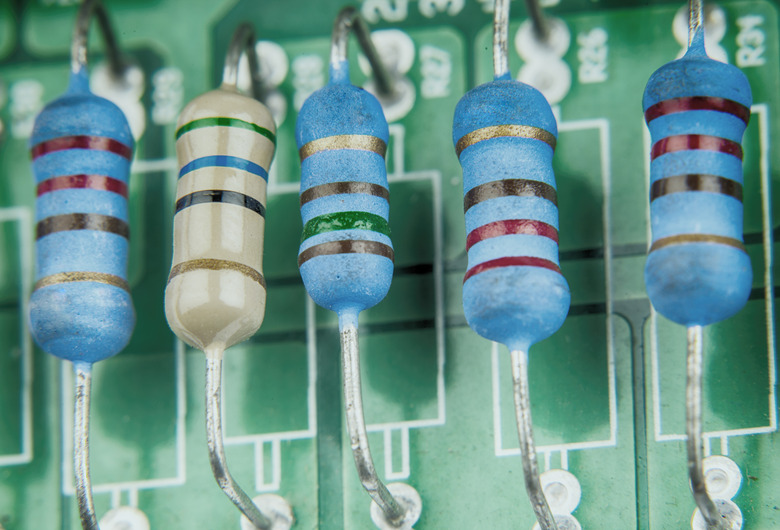What Happens When A Resistor Burns Up?
A resistor is an electronic device designed to limit the flow of electricity in a circuit. A resistor accomplishes this task by being made of materials that are semiconductive. When electricity is conducted through a resistor, heat is generated and dissipated through the surrounding air. Under excessive voltage, a resistor generates so much heat that it cannot dissipate the heat quickly enough to prevent burning.
Normal Resistor Heat
Normal Resistor Heat
Resistors are designed to operate under specific voltages. The voltage rating of a resistor is designated by its wattage (power) value. When a resistor is functioning under a normal voltage load, it is operating as it should under a voltage that meets or falls below its power rating. The resistor will feel cool to warm by touch. The relatively low temperature is a result of the resistor acting as a semiconductor, meaning that it is allowing only a specific amount of current to flow through.
Current is the flow of electrons. When electrons meet resistance, as they do in a semiconductive material, they produce heat. Resistors are designed to dissipate the heat so the semiconductive material is not damaged.
Overheating of Resistor
Overheating of Resistor
When a resistor is placed under a voltage that approaches the upper limits of its power rating, the resistor generates more heat than normal. This is due to the voltage attempting to force more current (electrons) through the resistor than it is designed to pass. The resistor will be hot to touch and a faint whiff of burning may be detectable. The burning odor is the breaking down of the components of the resistor: the carbon, the clay binding agent and the color code pigment painted on the resistor.
Burning of Resistor
Burning of Resistor
When a resistor has been overloaded with voltage exceeding its power rating, the resistor will become very hot to touch, darken considerably and possibly even melt or catch on fire. Although a resistor may appear damaged at this point, it can still be functioning. However, it may be functioning with less resistance than it was originally designed for.
Burnt Resistor
Burnt Resistor
At this point, the resistor is unable to resist the flow of current forced through by the excessive voltage and the resistor breaks down. When a resistor breaks down, current typically flows through the burnt resistor without any resistance and thereby passes unchecked. Other components in the circuit may become damaged from the excess current flowing through.
References
- "Understanding Basic Electronics"; Larry D. Wolfgang; 2006
- "Teach Yourself Electricity and Electronics"; Stan Gibilisco; 1997
- "Basic Electricity and Electronics"; Charles Schuler, Richard Fowler; 1988
Cite This Article
MLA
Boyer, Timothy. "What Happens When A Resistor Burns Up?" sciencing.com, https://www.sciencing.com/happens-resistor-burns-up-8556222/. 13 March 2018.
APA
Boyer, Timothy. (2018, March 13). What Happens When A Resistor Burns Up?. sciencing.com. Retrieved from https://www.sciencing.com/happens-resistor-burns-up-8556222/
Chicago
Boyer, Timothy. What Happens When A Resistor Burns Up? last modified March 24, 2022. https://www.sciencing.com/happens-resistor-burns-up-8556222/
